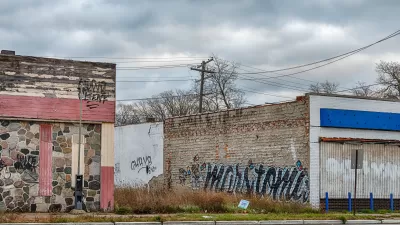Detroit's comeback has been well documented, as has its efforts to remove blight and demolish vacant properties. A new report sheds light on another of the city's deepest challenges: how to reform property taxes to achieve fiscal certainty.
"Detroit is still hindered in its recovery by structural flaws in its property tax system," according to a new report published by the Lincoln Institute of Land Policy.
A post on the Lincoln Institute's blog introduces the study, which details the multiple stresses on the city's fiscal system associated with property tax system, including high property tax rates, delinquencies, inaccurate assessments, overuse of tax breaks, and limitations imposed by the Michigan constitution and state statutes.
The report, titled Detroit and the Property Tax: Strategies to Improve Equity and Enhance Revenue and written by Gary Sands, Wayne State University professor emeritus of urban planning, also provides five suggestions for reforming Detroit's property tax system, which are informative for other post-industrial cities struggling to achieve fiscal balance. The reports suggested reforms:
- Continue to improve assessments
- Improve the targeting of tax abatements
- Implement a land-based tax
- Eliminate the state's taxable-value cap
- Reduce statutory tax rates
Christine MacDonald picked up the news of the report, providing coverage for The Detroit News. The article focuses mostly on the imbalance of tax breaks for businesses and the highest tax rates of any major city in the country for individual property owners.
FULL STORY: Detroit’s Property Tax: Averting Another Disaster

Alabama: Trump Terminates Settlements for Black Communities Harmed By Raw Sewage
Trump deemed the landmark civil rights agreement “illegal DEI and environmental justice policy.”

Planetizen Federal Action Tracker
A weekly monitor of how Trump’s orders and actions are impacting planners and planning in America.

The 120 Year Old Tiny Home Villages That Sheltered San Francisco’s Earthquake Refugees
More than a century ago, San Francisco mobilized to house thousands of residents displaced by the 1906 earthquake. Could their strategy offer a model for the present?

Ken Jennings Launches Transit Web Series
The Jeopardy champ wants you to ride public transit.

BLM To Rescind Public Lands Rule
The change will downgrade conservation, once again putting federal land at risk for mining and other extractive uses.

Indy Neighborhood Group Builds Temporary Multi-Use Path
Community members, aided in part by funding from the city, repurposed a vehicle lane to create a protected bike and pedestrian path for the summer season.
Urban Design for Planners 1: Software Tools
This six-course series explores essential urban design concepts using open source software and equips planners with the tools they need to participate fully in the urban design process.
Planning for Universal Design
Learn the tools for implementing Universal Design in planning regulations.
Clanton & Associates, Inc.
Jessamine County Fiscal Court
Institute for Housing and Urban Development Studies (IHS)
City of Grandview
Harvard GSD Executive Education
Toledo-Lucas County Plan Commissions
Salt Lake City
NYU Wagner Graduate School of Public Service




























